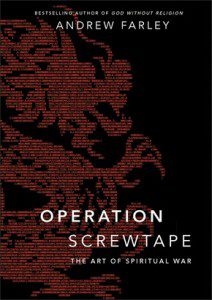 I must confess that I have never given a lot of theological energy to the idea of a personal Devil with a host of co-conspirators. It is clear to me that we are capable of enough mayhem on our own in the multi-factorial nature of life without much external help. Moreover, I believe positing two oppositional and personal cosmic forces leads to unresolved dualisms in theology and ethics. Having said that, the “art of spiritual war,” Dr. Andrew Farley’s subtitle of his new book Operation Screwtape, did catch my attention. The implication is that we live in a world saturated with spiritual forces, some coming directly from ourselves, that require our mindfulness, wisdom, and opposition. In such a world, we need – following the Sermon on the Mount – to cultivate the characteristics of what Dan Millman calls “a peaceful warrior.” The peaceful warrior humbly, yet powerfully, speaks for abundant life personally and globally in the context of death-oriented and individualistic powers.
I must confess that I have never given a lot of theological energy to the idea of a personal Devil with a host of co-conspirators. It is clear to me that we are capable of enough mayhem on our own in the multi-factorial nature of life without much external help. Moreover, I believe positing two oppositional and personal cosmic forces leads to unresolved dualisms in theology and ethics. Having said that, the “art of spiritual war,” Dr. Andrew Farley’s subtitle of his new book Operation Screwtape, did catch my attention. The implication is that we live in a world saturated with spiritual forces, some coming directly from ourselves, that require our mindfulness, wisdom, and opposition. In such a world, we need – following the Sermon on the Mount – to cultivate the characteristics of what Dan Millman calls “a peaceful warrior.” The peaceful warrior humbly, yet powerfully, speaks for abundant life personally and globally in the context of death-oriented and individualistic powers.
Regardless of its source, there are plenty of anti-life forces in our world. I recall social gospel pioneer Walter Rauschenbusch once saying that some people who believe in the orthodox doctrine of the Devil would not recognize him walking through Wall Street! I am sure we are not the crown of creation; I am equally sure that complexity and intelligence don’t always equate to moral stature. If there are higher beings than humans, we cannot guarantee that they support life, creativity, love, and healing. In fact, their complexity and power may issue in innovative ways of promoting self-interest, manipulating others for their own benefit or the benefit of their organizations or tribes. Moreover, as George McLain and Walter Wink suggest, the powers and principalities are ambiguous; institutions can succumb to evil, congregations can be engulfed by a spirit of negativity, groups can be possessed by violence or atavistic rage, and political groups can place self-interest and relative principles above the well-being of the country and the world. In such cases, a type of spiritual exorcism may be in order – a prayer for a new spirit or the banishing of malign spirits.
We can’t always identify such malign forces – and are tempted to identify them with our political or theological foes. Accordingly, any quest to discern the demonic or duel with what we presume to be demonic forces requires, first of all, looking in the mirror at our own imperfections and projections. Often, as Jesus noted, we need to take the log out of our own eye before excising the splinter from our neighbor’s eye. We need to avoid taking on the characteristics of the demonic – violence, polarization, alienation, dualism – in challenging demonic forces.
Still, what might be the characteristics of the demonic? With great humility, let me suggest the following and seemingly ordinary and pervasive images of the demonic:
- A deathful orientation – a spirit that sucks the life out of the environment and those around us.
- Narcissistic self-interest – a self-centered manipulation of others for our own purposes.
- Abuse of innocence.
- Apathetic individualism – focus on “me” and “my tribe.”
- Unbending “moral” principles, often used to diminish and malign others.
- The belief that we can live independently of others: self-made persons are susceptible to the temptation to use others for their own benefit.
- Seeing others as objects to be used, not living breathing subjects.
- Alienation from the body and the Good Earth.
- Failure to affirm the interdependence of life.
- Emphasis solely on the present moment to the detriment of the long haul.
- Violence and alienation: destruction and harm of others for our own ends.
- Racism, sexism, and classism.
- Empire-building and willingness to destroy the planet to preserve our interests.
You don’t have to be against God consciously to go against God’s vision of the world. In fact, I suspect that Screwtape and his minions believe that they are doing the right thing, given their value system.
The demonic is self-interested, alienated, materialistic, and death-full in its focus on gratification regardless of the consequences. The demonic is often present in our institutional polarization, doctrinal and political purity, and separation of the world into us-them categories, demanding total agreement and denouncing any form of disagreement.
The “peaceful warrior” is always involved in a type of spiritual contest, motivated more by affirmation than negation. Believing that even the demonic can be transformed, the peaceful warrior seeks, first of all, personal transformation. This means a largeness of spirit mated with a strong commitment to self-awareness, compassionate relationships, and just and healthy institutional life. Confronting the demonic requires self-awareness and the willingness to speak the truth – with care – to power, whether it is in the church, government, or family patterns.
Responding to the demonic must be saturated in prayer and alignment with visions larger than our own. Only large-spirited prayer, humility, and trust in the wisdom of the divine prevent us from destroying in our quest to save. The demonic must be confronted whether it appears disguised as “big brother,” opposition to rational approaches to gun ownership, consumerism, Ponzi schemes, preferential option for the wealthy and powerful, empire-building, or profiteering. But, remembering the interdependent fabric of life, we would do well to recognize that, like Jesus, our attempts to do the good may tempt us to settle for much less. Violence and scapegoating usually perpetuate more violence and alienation.
Transforming the demonic is ultimately a work of grace, as Farley asserts. Our greatest threat is not demonic spirits or institutional evil, but our unwillingness to accept the grace of God and God’s messengers whether angelic, human, or environmental. Leaning into God’s grace, we receive greater wisdom, power, and persistence in the quest for justice, healing, and shalom.This may involve confrontation, and such confrontation requires a wisdom and energy greater than that of our individual and often fearful self. It involves an opening to becoming God’s companion, trusting divine inspiration and wisdom to give us the guidance and energy to take responsibility for our role as God’s partners in healing the earth. Otherwise we may become unknowing agents of the demonic ourselves!
For more conversation on Operation Screwtape: The Art of Spiritual War, visit the Patheos Book Club here.













